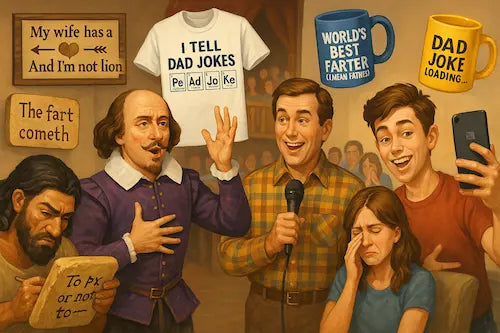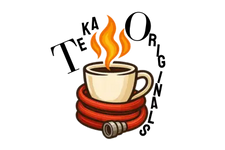Dad Jokes: From Ancient Groans to Modern Merch

Dad jokes aren’t just jokes—they’re cultural fossils that refused to stay buried. From ancient puns in dusty scrolls to sitcom dads in the 70s, to TikTok roasts today, dad humor has been both mocked and immortalized. Now it’s a booming product line: mugs, tees, plaques, stickers. This 4,000-word no-holds-bar romp unpacks why dad jokes became generational lightning rods, why society turned on dads, and why cheesy humor still sells like hotcakes.
____________________________________________________________________

Welcome to the Groan Show
There are two kinds of people in this world: those who laugh at dad jokes, and those who pretend not to. Either way, you’ve been infected. Maybe it was your own father, maybe it was a sitcom rerun, maybe it was that guy in the office who should’ve been fired for crimes against comedy but instead got promoted to middle management because he’s “relatable.” Wherever it came from, the dad joke has stalked you across time and space, haunting barbecues, birthday parties, and every single family road trip.
But dad jokes aren’t just innocent groaners anymore. They’ve evolved. They’ve crawled out of the primordial muck of “Why did the chicken cross the road?” and mutated into memes, merchandise, and entire subgenres of TikTok comedy. What was once a warm-hearted groan has become an actual economy. You can now buy your shame in cotton blend t-shirts, ceramic mugs, and plaques that hang proudly in basements everywhere.
So let’s rewind history, drag dad jokes through the decades, and figure out why they’re the most unstoppable, cringe-inducing, weirdly wholesome, and now profitable form of humor in human existence.
Ancient History: Dads Didn’t Invent This, They Perfected It
Long before polyester slacks and New Balance sneakers, humans were telling dad jokes. In fact, one of the oldest recorded jokes in human history is essentially a dad joke. Archaeologists unearthed a Sumerian tablet from 1900 BC with what amounts to the first groaner:
“Something which has never occurred since time immemorial; a young woman did not fart in her husband’s lap.”
Crude? Sure. But let’s face it—that’s the Mesopotamian version of, “Pull my finger.”
The Greeks loved their wordplay. Aristophanes filled his plays with puns, innuendo, and groan-inducing double meanings that would make a modern audience roll their eyes so hard they’d see their own brains. Shakespeare, the king of theater, was also the king of weaponized dad jokes. His works are riddled with puns so shameless that you can almost hear Elizabethan teenagers sighing, “Ugh, Dad!” from the cheap seats.
The point is: dads didn’t invent bad jokes. Humanity did. But dads, somewhere between paying the mortgage and grilling burgers, claimed ownership of this form of humor and weaponized it in ways that have traumatized children for generations.

The Golden Age of Dad Jokes: 1960s–70s
The 60s and 70s gave us many things: disco, bell-bottoms, civil rights battles, the moon landing—and sitcom dads.
Television became the global amplifier of dad jokes. Shows like Leave It to Beaver and The Brady Bunch featured father figures who were part wisdom-dispensers, part walking punchline. Their jokes weren’t edgy; they were safe, family-friendly, and so corny you could butter them. But that was the point—dad humor was wholesome, a verbal pat on the back wrapped in a pun.
In the 70s, as counterculture raged, dads doubled down on their safe, pun-heavy arsenal. While young people were listening to Hendrix, protesting wars, and discovering substances that made velvet posters glow, dads were standing at barbecues saying, “Lettuce turnip the beet” while holding a salad bowl. They weren’t trying to be cool—they were trying to anchor their families in something predictable and dumb enough to cut through chaos.
This is also the era when dad jokes got their reputation: jokes so safe they could only come from a man wearing socks with sandals.
1980s–1990s: The Dad Joke as National Sport
By the 80s, sitcom dads had turned the dad joke into an institution. Cliff Huxtable, Danny Tanner, Carl Winslow—TV fathers everywhere were slinging G-rated zingers like drunk cowboys at a pun rodeo. Stand-up comics even adopted the style, mocking the square, bumbling dad as a caricature.
This was the era when dad jokes became memetic—not yet memes in the digital sense, but repetitive cultural shorthand. Jokes recycled themselves at every cookout and PTA meeting: “Hi Hungry, I’m Dad.” “Did you hear about the guy who invented Lifesavers? He made a mint.” By the time AOL was screeching its way into our homes, these lines had become immortal.
Meanwhile, real kids were rolling their eyes so hard they could power wind turbines. And yet, those kids grew up to… tell the same damn jokes. Dad humor had successfully embedded itself into our DNA.

2000s–2010s: Irony, Memes, and Merch
Here’s where things shifted. The internet cracked open the vault and spilled dad jokes everywhere. Forums, Reddit threads, and meme pages began collecting them like fossils. Suddenly, dad jokes weren’t just tolerated—they were ironically celebrated.
This is when dad jokes transitioned into products. Suddenly, you could buy a mug that said, “Best Farter—I Mean Father.” T-shirts appeared with slogans like, “I’m reading a book on anti-gravity—it’s impossible to put down.” Etsy exploded with wooden plaques engraved with puns so groan-inducing they could be used as medieval torture devices.
Irony saved dad jokes. Millennials and Gen Z, raised in sarcasm and cynicism, found something perversely comforting about humor so bad it circled back to being good. Mocking dad jokes became loving them, and buying them became a way of participating in the joke.
2020s: The Dad Joke as Counterculture
Today, dad jokes are no longer just a thing dads say. They’re a cultural identity. Wearing a dad joke shirt is a form of rebellion—not against authority, but against irony itself. While Gen Z roasts their parents online for being “cringe,” they simultaneously keep dad jokes alive by sharing memes and buying merch.
But here’s the kicker: dads themselves have become fair game. In the 60s and 70s, dads were respected authority figures, if occasionally mocked. Today? Entire generations treat dads like outdated apps. Disrespect is built into modern humor—dads aren’t just the butt of the joke, they are the joke.
And yet, dad jokes persist. Why? Because they’re bulletproof. You can’t cancel a pun. You can’t fact-check a groaner. You can only roll your eyes, laugh despite yourself, and maybe… buy the damn t-shirt.
Why Dad Jokes Sell
Humor sells because it connects. Dad jokes sell because they’re universal. Everyone has a dad, knew a dad, or has been dad-adjacent. When you slap a pun on a mug, you’re not just selling ceramic—you’re selling recognition, nostalgia, and a shared cultural groan.
Think about it: A shirt that says, “Nacho Average Dad” will outsell a plain polo every day of the week. Why? Because it’s not about fashion. It’s about announcing, “Yes, I’m corny. Yes, my kids hate it. And yes, I’m immortal.”

In an era where brands are desperate to seem authentic, dad jokes are the ultimate authenticity. They don’t try to be cool—they revel in being uncool. That’s why mugs, tees, plaques, even socks covered in bad puns sell like crazy. People want to wear the joke, not just tell it.
Conclusion: Long Live the Groan
From Sumerian fart jokes to Shakespearean puns, from sitcom dads in the 70s to TikTok roasts in 2025, dad jokes have survived cultural revolutions, technological upheaval, and generational disrespect. They’ve been mocked, celebrated, commodified, and sold by the truckload.

And here’s the ultimate truth: dad jokes aren’t really about comedy. They’re about connection. A dad joke says, “I love you, but I’m going to annoy you.” It’s humor as affection, pun as bond, groan as proof of family ties. That’s why, even in a world where dads are memes, their jokes will never die.
So go ahead—buy the mug, wear the shirt, hang the plaque. You’re not just purchasing merch. You’re buying into a 4,000-year-old tradition of laughter, groans, and love disguised as bad wordplay.
Because no matter how society changes, one thing will always be true: I’m Dad. Hi Hungry. Nice to meet you.
